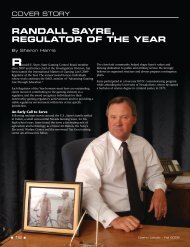View current issue (PDF) - International Masters of Gaming Law
View current issue (PDF) - International Masters of Gaming Law
View current issue (PDF) - International Masters of Gaming Law
Create successful ePaper yourself
Turn your PDF publications into a flip-book with our unique Google optimized e-Paper software.
The right to advertise gives the licensedoperators the ability to build brandawareness and acceptance for privateoperators in the public opinion, andslowly but surely the <strong>of</strong>fering <strong>of</strong> bettingand online casinos is being recognizedas legitimate adult entertainment, andno longer something illegal which shouldbe avoided.Is Online gamblinginteresting for capital investors?It is a general misperception <strong>of</strong> thegambling industry that the operation <strong>of</strong>online gambling is like printing money.There are many operators availableonline and the competition is only a fewclicks away. Further, because manypeople including politicians still believethat it is easy to make a lot <strong>of</strong> money withlittle effort in the online gambling industry,the revenues derived from betting andonline gambling are heavily taxed. Finally,and possibly due to the history <strong>of</strong> thegambling industry and its previous linksto organized crime, the licenses and theoperation <strong>of</strong> betting and online gamblingare subject to detailed regulation and strictsupervision and control from the localgambling boards.In other words the industry is faced witha high level <strong>of</strong> taxation, high expenses oncompliance and low margins as a result <strong>of</strong>strong competition.This being said the operators that knowtheir business and run a smooth andpr<strong>of</strong>essional operation are making money.The bigger operators and operators thathave been established for a longer period <strong>of</strong>time and consequently have a known andpopular brand, do generate pr<strong>of</strong>its that areindeed attractive for investors.With the legislative reforms in Europe,the industry is beginning to enjoy muchhigher levels <strong>of</strong> acceptance as a legitimateentertainment industry. This also means thatthe number <strong>of</strong> potential customers for theprivate operators increase. As people beginto realize that betting and playing casinogames and poker online is not illegal, andthat licensed operators are under supervision<strong>of</strong> the national gambling control board, theyconclude that it is safe to play. The formermonopoly operators typically are <strong>of</strong>feringfewer and less interesting products at ahigher price than the private operators.Yet, in certain European jurisdictionsprivate operators face huge challengescoping with competition from the stateowned former monopoly operators. This isnot due to the state owned operators’ abilityto run their operations at a more pr<strong>of</strong>itablelevel, but simply because the state ownedoperators have been given a huge and unfaircompetition advantage.In Denmark the state owned operator,Danske Spil, has been forced to split itsoperation between two different companies:one company to <strong>of</strong>fer the games on whichDanske Spil continues to enjoy a monopoly(horse race betting, lotteries and bingo) andanother company to <strong>of</strong>fer the games that areopen to private operators as well. However,the Danish authorities allow Danske Spilto use the same brand for both companies.This allows Danske Spil to contribute most<strong>of</strong> the brand awareness marketing costs tothe monopoly company where the marginis not under pressure from competition,giving the licensed games company anunfair advantage against the privateoperators on the market for licensed games.The authorities have also allowed DanskeSpil to cross sell their licensed games tothe customers in their monopoly gamescustomer database.Competing with large state ownedcompanies requires a considerable amount<strong>of</strong> money. Although public opinion ischanging in the favor <strong>of</strong> the industry, banksand other financial institutions have provenreluctant to get involved with the onlinegambling industry, despite the fact thatlicensed operators are legal and regulated.However, for political reasons banks,at least in Denmark, refuse to have onlinegambling operators as customers withDanske Spil as the only exception. Thisapproach from banks and the lack <strong>of</strong> accessto opening a Danish bank account meansthat it is more difficult for operators licensedin Denmark to provide optimal customerservice to their Danish customers. .With increasing levels <strong>of</strong> competitionand increasing costs for taxes and licenses,it is not unlikely that at least someoperators will need external capital tomaintain their ability to compete in terms<strong>of</strong> securing customers through marketingand promotions and by developing andreinventing available products to keep theiroperation attractive to the market.Current trends make the online gamblingindustry a good option for capital investors.Capital investment ina gambling operatorAs a consequence <strong>of</strong> the detailed regulationsand compliance requirements, incorporatedinto most gambling legislation regimes,purchasing voting power and ownershipin a gambling operator presents obstaclesthat are unknown to most other industries.Many jurisdictions require licensingnot only <strong>of</strong> the entity which is legallyresponsible for the provision <strong>of</strong> gamblingservices, but also <strong>of</strong> the key individualsthat are part <strong>of</strong> management and/or whohold a certain size <strong>of</strong> the ownership <strong>of</strong>such entities.Although licensing <strong>of</strong> individuals is notrequired yet under Danish law, the Danishgambling legislation also requires disclosure<strong>of</strong> ultimate beneficial owners and certaindata regarding such individuals.The Danish legislation sets two differentthresholds. The first level is defined asqualified ownership and includes everybodywith an ownership <strong>of</strong> 10 % or more. Thesecond level is 50% ownership or more.If a person owns more than 10% <strong>of</strong>the license holder/applicant, then thatperson must submit a personal declarationto the Danish Gambling Authority.The personal declaration must containinformation <strong>of</strong> marital status, place <strong>of</strong>residence for the latest 10 years, someaspects <strong>of</strong> that person’s career and financialstatus and criminal record.The same requirement applies forexecutive <strong>of</strong>ficers and board members incompanies that own 10 % or more <strong>of</strong> theshares in a gambling operator licensed inDenmark.If the 50% threshold is reached, additionalfinancial information about the natural orlegal person holding 50% or more <strong>of</strong> theownership interest in the gambling operatormust be submitted including operatingbudget audited annual reports covering thelatest 5 years.In situations where the above mentionedthresholds <strong>of</strong> ownership <strong>of</strong> a gamblingoperator, which holds a license in Denmarkand which has already initiated operationin Denmark, are reached the new ownermust be approved by the Danish GamblingAuthority before the ownership title to theEuropean <strong>Gaming</strong> <strong>Law</strong>yer | Autumn Issue | 2013 | 33



